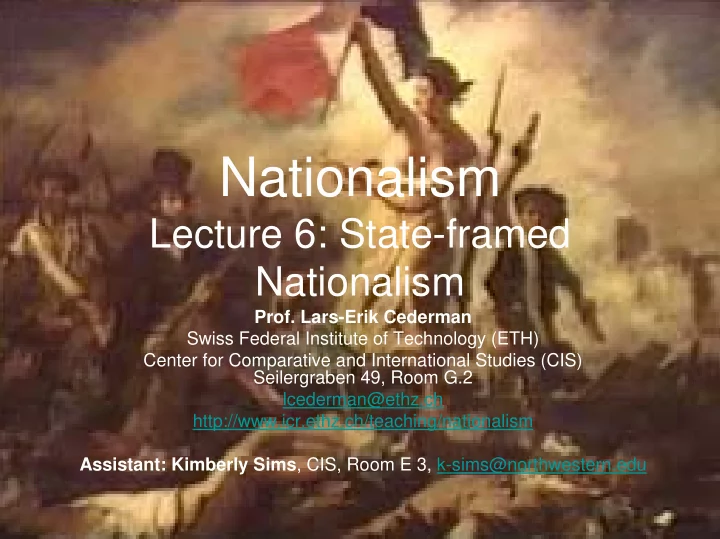

Nationalism Lecture 6: State-framed Nationalism Prof. Lars-Erik Cederman Swiss Federal Institute of Technology (ETH) Center for Comparative and International Studies (CIS) Seilergraben 49, Room G.2 lcederman@ethz.ch http://www.icr.ethz.ch/teaching/nationalism Assistant: Kimberly Sims , CIS, Room E 3, k-sims@northwestern.edu
Nationalism’s Three Time- Zones in State-Framed Europe Nationalism Unification Nationalism French Separatist Revolution Nationalism
Three types of nationalism Common state? no yes Common nation? Separatist no nationalism State-framed nationalism yes Unification nationalism
State-Framed Nationalism Common state? No Yes Phase I: State- Common nation? formation No Phase II: Nation-building Yes
State-framed nationalism • State-formation – conquest and geopolitical absorption create stable state early with well-defined borders • Nation-building – Breuilly: opposition to state penetration – Mann: more on mechanisms: church, state (armed forces, state education, bureaucracy), commerce, civil society
The British case • State formation very early! – Limited, well-bounded territory – Centralized state institutions early on – Break from Rome – State benefited from commerce • Early development of “proto- nationalism”: sovereignty legitimized as contract between the king and his subjects
The emergence of British national identity • The birth date of British nationalism depends on defintions: – Henry VIII’s break from Rome in 1532 (Greenfeld) – Post-civil war settlement in 1688 Henry VIII (Breuilly) – The Act of Union in 1707 which added Scotland to England and Wales – After Napoleonic wars (Colley) Thomas Moore
The mechanisms of British nation-building • Warfare with Catholic French “other” • Imperial expansion • Communications Scene from “The Holy Grail”
The French case • State-formation – First French kings extended power through indirect means – Louis XIV strengthened the state through internal conquest, coercion, and taxation – Absolutism resulted – Commerce was not as vivid as in Britain Louis XIV
The emergence of French national identity • Increasing state-led extraction • Intellectual currents: Enlightenment • Parliament invoked but royal concessions come too late • Explosive protest against “ ancien régime ”: • The French Revolution of 1789
A conceptual revolution • Nation = People = Third Estate • Principle of popular, ascending sovereignty • Abbé Sieyès: “What is the Third Estate?”: “ The nation is prior to everything. It is the source of everything. Its will is always legal; indeed it is the law itself... The power exercised by the government has substance only insofar as it is constitutional; it is legal only insofar as it is based on the prescribed laws. The national will, on the contrary, never needs anything but its own existence to be legal. It is the source of all legality. ”
Nation-Building in the 19th century • Eugen Weber’s From Peasants to Frenchmen : – Starting point: “a country of savages” – Agents of change: • roads • schools (Jules Ferry’s reforms in the 1880s) • movement (urbanization, migration, military) Jules Ferry
Recommend
More recommend